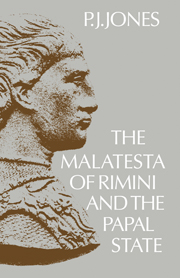Book contents
- Frontmatter
- Contents
- Dedication
- Preface
- Abbreviations
- Map of Romagna and the Marche in the later Middle Ages
- 1 The Papal State and Romagna in the thirteenth century
- 2 Rimini and the rise of the Malatesta
- 3 From commune to papal vicariate
- 4 Galeotto Malatesta, ‘ecclesie pugil’
- 5 The prime of Malatesta rule: Carlo Malatesta
- 6 The pontificate of Martin V
- 7 Sigismondo Pandolfo Malatesta, ‘fex Italiae’
- 8 The papal reconquest
- 9 The government of the Malatesta: I. The papal vicariate
- 10 The government of the Malatesta: II. The signoria
- Appendix
- Bibliography
- Index
4 - Galeotto Malatesta, ‘ecclesie pugil’
Published online by Cambridge University Press: 23 December 2009
- Frontmatter
- Contents
- Dedication
- Preface
- Abbreviations
- Map of Romagna and the Marche in the later Middle Ages
- 1 The Papal State and Romagna in the thirteenth century
- 2 Rimini and the rise of the Malatesta
- 3 From commune to papal vicariate
- 4 Galeotto Malatesta, ‘ecclesie pugil’
- 5 The prime of Malatesta rule: Carlo Malatesta
- 6 The pontificate of Martin V
- 7 Sigismondo Pandolfo Malatesta, ‘fex Italiae’
- 8 The papal reconquest
- 9 The government of the Malatesta: I. The papal vicariate
- 10 The government of the Malatesta: II. The signoria
- Appendix
- Bibliography
- Index
Summary
The compromise of 1355 marked the beginning of a long and close association with the church, which was to bring the Malatesta a rich succession of titles, honours and gifts of territory, and become in time the first condition of their survival as signori. Inflexibly loyal to the papacy, but favoured also by events in Italy and Europe, they were able again, and this time with the goodwill of the church, to win control of a wide dominion only less extensive than that which they had quickly and precariously conquered during the years of rebellion. Each new pope had occasion to praise or reward their services, often using phrases of a more than formal gratitude which distinguished them from other and less powerful subjects. But before the alliance was finally established, the Malatesta were obliged to give active proof of their fidelity, and satisfy the papacy that their submission was sincere by helping the legate to overcome the same independent spirit which they had lately fought to defend.
By the end of 1355 the March of Ancona, which Albornoz had found ‘volubilis velut rota et labilis ut anguilla’, was nearly all subdued, the provincial administration was returning to efficiency, and the legate was free to resume his work of reconquest in Romagna, where the Manfredi of Faenza, and Francesco Ordelaffi at Forli, Cesena and elsewhere, persisted in revolt. During the winter months a crusade was preached against the tiranni. A full remission of sins was assured to all who took up arms and served for one year. The papal collectors were prodigal of still more generous promises; and the response to their appeal was wide.
- Type
- Chapter
- Information
- The Malatesta of Rimini and the Papal State , pp. 79 - 101Publisher: Cambridge University PressPrint publication year: 1974



